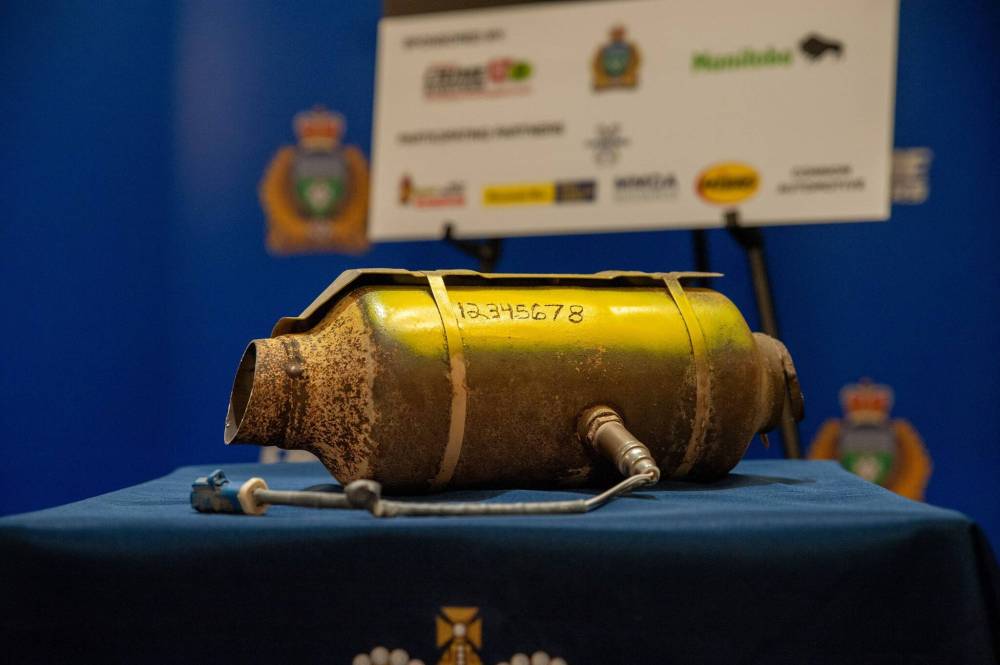Province launches catalytic converter ID anti-theft campaign
Advertisement
Read this article for free:
or
Already have an account? Log in here »
To continue reading, please subscribe:
Monthly Digital Subscription
$0 for the first 4 weeks*
- Enjoy unlimited reading on winnipegfreepress.com
- Read the E-Edition, our digital replica newspaper
- Access News Break, our award-winning app
- Play interactive puzzles
*No charge for 4 weeks then price increases to the regular rate of $19.00 plus GST every four weeks. Offer available to new and qualified returning subscribers only. Cancel any time.
Monthly Digital Subscription
$4.75/week*
- Enjoy unlimited reading on winnipegfreepress.com
- Read the E-Edition, our digital replica newspaper
- Access News Break, our award-winning app
- Play interactive puzzles
*Billed as $19 plus GST every four weeks. Cancel any time.
To continue reading, please subscribe:
Add Free Press access to your Brandon Sun subscription for only an additional
$1 for the first 4 weeks*
*Your next subscription payment will increase by $1.00 and you will be charged $16.99 plus GST for four weeks. After four weeks, your payment will increase to $23.99 plus GST every four weeks.
Read unlimited articles for free today:
or
Already have an account? Log in here »
Hey there, time traveller!
This article was published 18/07/2022 (1238 days ago), so information in it may no longer be current.
High-visibility paint and an eight-digit number will serve as a warning to potential catalytic converter thieves the valuable part can be traced, as Manitoba scrap metal dealers must now report the purchase of such devices to police or face a hefty fine.
On Monday, the Progressive Conservative government’s Scrap Metal Act and regulations came into force, alongside the launch of a new campaign to etch vehicle identification onto catalytic converters in Winnipeg and Steinbach.
“There hasn’t been a simple solution found in any jurisdiction, but it is important that in Manitoba we do what we can. We try the efforts that can make a difference in our province and reduce those thefts,” Justice Minister Kelvin Goertzen said during a joint news conference at Winnipeg Police Service headquarters.

The Scrap Metal Act contains a number of new regulations for the province’s recyclers, intended to cut down on the sale and purchase of illegally obtained precious metals — including those contained in catalytic converters, which are integral to controlling harmful emissions in an automotive internal combustion engine.
Notably, metal recyclers must now document and photograph all converters purchased and hand over their records to local authorities on a weekly basis. Recyclers will not be allowed to pay cash for converters or any sales worth more than $50.
According to Manitoba Public Insurance, claims for converter thefts cost $4.7 million in the past fiscal year, with the Crown corporation paying an average of $2,100 per claim. Scrap yards pay between $100 and $500 per unit, according to Winnipeg police.
Goertzen admitted the legislation will only go so far in driving down the rash of converter thefts and a multi-pronged approach will be necessary.
“This legislation and the regulations aren’t intended to be a cure-all. It won’t stop, entirely, theft of catalytic converters or other precious metals but it is intended to disrupt those who are causing these thefts in our community.”
As of Monday, more than 30 auto service centres in Winnipeg had received etching equipment from Crime Stoppers — purchased through the province’s criminal property forfeiture fund — to engrave vehicle ID numbers into their customers’ converters and mark the part with fluorescent paint.
Another 50 pieces of etching equipment will be distributed in Steinbach as part of a pilot project with the Manitoba RCMP. The service is being provided at no cost to customers or the government, according to the province.

The mark will allow police to better establish whether a converter was reported stolen, RCMP Supt. Jim Mirza said.
“If they are stolen and located, at least it provides us with a possible lead to track where they came from,” Mirza said. “Not only will this help us catch the perpetrators, we hope that this will also prevent the crime from happening in the first place now that it is known that the items can be traceable and possession of stolen goods can be proven.”
The new legislation and converter identification program, combined with the existing City of Winnipeg bylaw, will also give police significantly more resources to investigate reported thefts and identify suspects, Winnipeg Police Staff Sgt. Josh Ewatski said.
Last month, police raided a Rural Municipality of Springfield-area scrap yard and charged three men for allegedly trading in large quantities of stolen converters. Reported thefts have dropped by 95 per cent since police broke up the operation, but the crime trend is expected to rebound, Ewatski said.
Vehicle owners will not be offered any breaks on their MPI insurance if they agree to have their converter engraved. Goertzen said the province must evaluate the program before it is expanded, adding auto manufacturers have a role to play by providing anti-theft devices.
Super Auto Centres president Jonnie Hendrickson said customers can expect to spend an additional 10 to 15 minutes in the service bay at one of the company’s three participating locations to have a converter marked.
“We do see a lot of customers come in with this issue,” Hendrickson said, adding her company’s fleet of courtesy vehicles, too, has been targeted. “We see the frustration and stress when they’ve had this part stolen and they’re in that tough position of either waiting for up to the six weeks it can take for MPI to approve and replace this part.

“If it helps in any way, and if it helps prevent these people from stealing this part or causing more damage to your car, then we’re happy to do that.”
Scrap metal recyclers who do not follow the new regulations face up to $15,000 for a first offence and $50,000 for second and subsequent offences. Goertzen said the justice department will be monitoring and reaching out to ensure compliance.
danielle.dasilva@freepress.mb.ca

Our newsroom depends on a growing audience of readers to power our journalism. If you are not a paid reader, please consider becoming a subscriber.
Our newsroom depends on its audience of readers to power our journalism. Thank you for your support.





